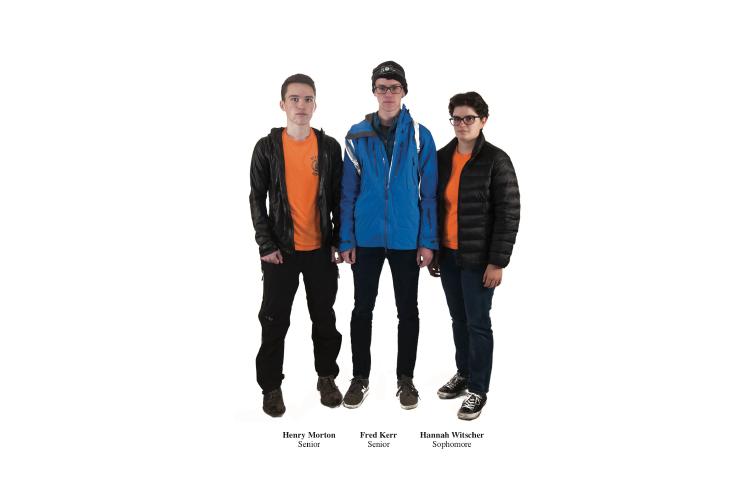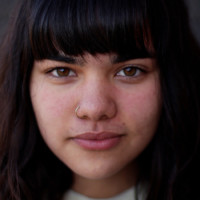
What is Search and Rescue?
Witscher: Search and Rescue is what it sounds like. We mainly look for missing hikers, usually in the (Columbia River) Gorge. We also help with evidence searches and rescues. So if somebody gets hurt while they’re hiking and needs a medical extraction, we help with that. Our team is technically the Multnomah County Sheriff Office’s Search and Rescue. Most of us are high school students; we have some adults, but anyone over 14 can join. All of our leadership — the officers, team leaders and our president — are all high school students, which is pretty cool … I feel like it definitely gives high schoolers an opportunity to live up to their responsibility and you get a chance to do something important … At this point, I could go lead a team in the field on an actual search.
Why is Search and Rescue important to you?
Morton: To me, Search and Rescue has always been an opportunity to engage in my community while doing something that I care about. I’ve always been a very outdoorsy person; I love to hike, I spend most of my summer camping or backpacking. I guess I was just always sort of drawn to the beauty of (the outdoors). Just standing at a viewpoint somewhere and looking over a river or valley never ceases to amaze me. I heard about (Search and Rescue) from Colin Klein … the president now of Search and Rescue. He told me about it, and I just thought it’d be a good way to give back to the outdoor community that I really love.
What has been your most intense moment from Search and Rescue?
Kerr: I’ve found one person so far, and that was my biggest moment for sure. It was a training weekend, so we were doing a really long hike and it was going to be 10-plus miles. It was raining really hard the entire day. And pretty early on … we got a real call … to search for an actual (missing) person. (Our team was) the closest to the presumed location of the subject … so we went straight to that location. By the time we got there, it was the evening and still raining. We just walked down the trail, and we saw (the missing woman) coming towards us; she was very glad to be found … It was my first time finding someone in my Search and Rescue career. We’d been doing all this training to search for people and find them and rescue them, and then finally it was actually the real thing.
You recently worked during the Eagle Creek Fire. What was that like?
Morton: We were going door-to-door and gathering information about how many people were there, whether they had a place to evacuate to, if everyone in their family could evacuate … And eventually when the fire progressed to the west, we were telling them that it was time to evacuate … I had never really interacted with the people who live in that area of the Gorge … It’s an interesting place because the people who live out there live out there for a reason. They don’t like being bothered. We had to have a sheriff’s deputy with us because
some of (the residents) are kind of combative. It was sad for me to be out there watching the area that I’ve spent so much time in burn down, but I was glad that we got to be a part of the effort to help people.
How were you feeling when you were asked to go out and help in the fire?
Kerr: I was a little bit apprehensive because I didn’t know what I was going to be doing, but I was also excited to be able to help … (That) was nerve-racking because it was dangerous to be near the fire and going up to people’s homes in the dark made me a little bit nervous.
What was it like evacuating people?
Witscher: We had packets of information for people, telling them that they were under an evacuation. There’s three different levels (of wildfires). For our first (level), we were just going door-to-door (saying), “Hey, you might have to evacuate, there’s a wildfire near you. Here’s some information about how to keep your house safe, who you can ask if you need help getting out of your house.” So we were doing that initially, but then all of a sudden, it jumped to levels two and three. Level two is like, “Maybe you should (evacuate),” but then level three is mandatory evacuation. “You need to leave right now.”
How was this different from other Search and Rescue missions?
Morton: Normally, Search and Rescue is this thing where you get on a trail and you look for somebody, and this was a much more interactive experience. You have to talk to these people, and you have to figure out where they’re at. A lot of the time the people are pretty distressed; they think their houses could possibly burn down. When people’s family members are lost they’re distressed, but (this was) a different situation.
What emotions were you feeling while working in the fire?
Witscher: In the moment I was just tired … but then afterwards, I went home and was just upset and angry about the kid who had started the fire. I mean, I know that teenagers do dumb things … their brains aren’t fully developed, but it was still really frustrating to have a bunch of 15 and 16-year-olds out there helping fix (the kid’s) mistake.
How did this experience impact you?
Morton: As a team, we now don’t have a place to train. Where we trained was almost exclusively in the Gorge, and for the foreseeable future, all the trails are closed because they’re not safe to hike on, because of all the erosion that the fire has caused. I’m certainly more aware about fire safety now than I was before … and I’m definitely just more cognizant of the community out there in the Gorge that’s actively living there.




